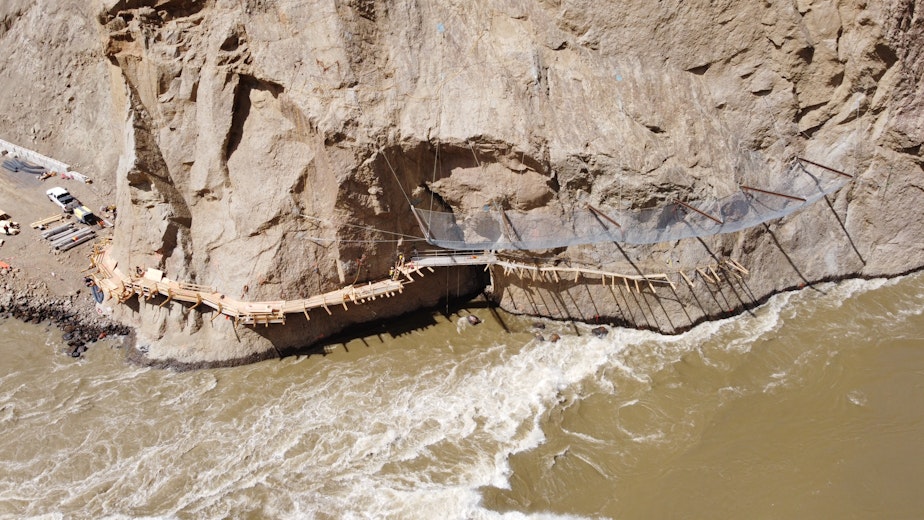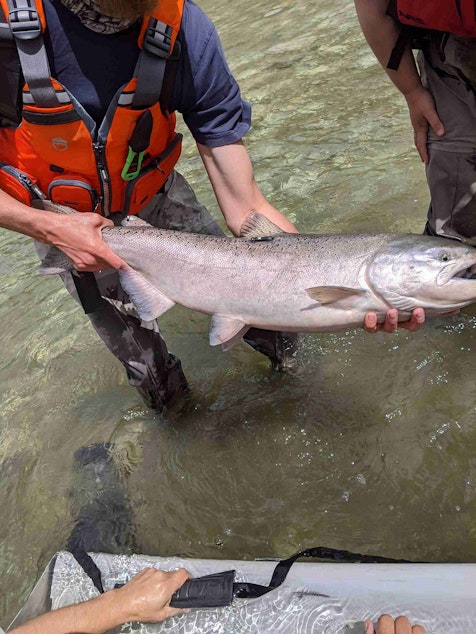The scramble to help Chinook salmon past landslide danger zone

One of the most important food sources for the Northwest’s endangered orcas was devastated by a rockslide last year, Canadian officials have revealed.
Officials are now scrambling to help this year’s Chinook salmon migrate past the danger zone on Canada’s Fraser River to avoid a repeat of last year’s disaster.
Those efforts include building a road to reach the remote site, blasting boulders out of the river, building a fish ladder and suspending a “salmon cannon” from the sheer canyon walls to suction fish past the obstruction.
“We are doing everything we possibly can to maintain those stocks because once they’re gone, they’re not coming back,” Bernadette Jordan, the Minister of Fisheries, Oceans and the Canadian Coast Guard, told a Canadian House of Commons Committee on June 9. “We want to be able to make sure southern resident killer whales have a food supply.”
Jordan likened the rockslide to a 33-story apartment building crashing into the river.
Members of Parliament questioned the cost, timeliness and effectiveness of the multimillion-dollar effort, more than a year after the slide fell.
Fisheries and Oceans Canada estimates that 89 percent of the Fraser’s spring Chinooks and 50 percent of its summer Chinooks last year were stopped by the massive Big Bar landslide, about 250 miles upstream of Vancouver, British Columbia.
Sponsored
Those big Canadian salmon, with enough muscle and fat to power their way as much as 750 miles upstream, are the main reason Washington’s San Juan Islands are graced by orcas.
Millions of salmon swim through the San Juans each year on their way to the mouth of the Fraser, about 30 miles to the north.
Most years, the Fraser River produces more Chinook salmon than all the rivers of Puget Sound combined.
The endangered, fish-eating orcas rely primarily on Chinook salmon.
Canadian officials said the Fraser’s sockeye salmon, important for commercial and indigenous fisheries on both sides of the border, also took a huge hit: 99 percent of “early Stuart” sockeye, 57 percent of “early summer” sockeye, and 20 percent of summer sockeye failed to make it past the rockslide last year.
Sponsored
Fisheries officials learned of the rockslide from satellite imagery in June 2019, perhaps 8 months after it fell in a remote canyon.
Salmon rescue efforts, including helicopter airlifts for stranded fish, kicked in by mid-July.
Those efforts were too late for thousands of fish that spent a month or more hurling their bodies against an insurmountable obstacle in a futile effort to return to their spawning grounds.
Later in the summer and fall, lower river flows also made the underwater obstruction easier to swim past.

Sponsored
Fisheries and Oceans Canada spokesperson Kavitha Palanisamy said in an email that at least 245,000 salmon managed to swim above the slide area last year.
Helicopters also ferried sloshing tanks with 60,000 fish around the hazard. Only half of those fish survived the airlift in good enough health to continue migrating upstream, according to Palanisamy.
In 2018, before the slide, the Committee on the Status of Endangered Wildlife in Canada reported that 11 of 13 Fraser River Chinook stocks were either threatened or endangered with extinction.
Declining numbers of Fraser Chinooks have been linked to orcas' spending less time around the San Juan Islands in recent years.
Fisheries managers won’t know how successful efforts at the Big Bar landslide have been until the biggest Chinook runs head upstream later this summer.




